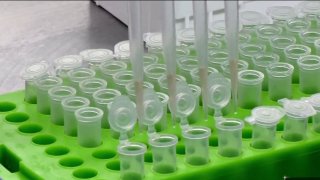
As the public health emergency declaration regarding the COVID-19 pandemic is slated to end on May 11, Chicago health officials are advising residents of upcoming changes to access to vaccines and testing, as well as the need to re-enroll in coverage for Medicaid patients.
Despite the end of the emergency declaration, the Chicago Department of Public Health said that local COVID-19 data will continue to be monitored, including variant and wastewater data.
With the end of the emergency, COVID-19 tests, vaccines and treatments will no longer be available to everyone free of cost, as health insurance companies will begin to have to pay for COVID countermeasures instead of the federal government.
City health officials said COVID-19 vaccines will remain available for all Chicagoans ages 6 months and up at pharmacies, doctors' offices, hospitals, community health centers, city-operated clinics and the mobile CareVan.
For as long as the city's supply of federally purchased COVID-19 vaccines remain available, all vaccines will be free to Chicagoans, regardless of insurance coverage.
While at-home antigen tests and lab-based PCR tests will continue to be available around Chicago, they will no longer be at no cost to everyone.
Private insurance companies are no longer required to pay for at-home tests, and Medicare recipients will no longer receive free at-home tests. Medicaid will continue to cover the cost of at-home tests.
Local
Residents are encouraged to contact their insurance provider to receive more information, and are also encouraged to stock up on free at-home tests prior to the end of the federal emergency on May 11.
In addition, while supplies last, every household can still have free tests mailed to them at home. Residents can enter their mailing address here to have tests mailed to their home.
Feeling out of the loop? We'll catch you up on the Chicago news you need to know. Sign up for the weekly Chicago Catch-Up newsletter here.
Lab-based PCR tests will remain available at select pharmacies, hospitals and health clinics, according to city officials.
While Medicare and Medicaid will continue to cover the costs of PCR tests, private insurance companies may require co-pays for them.
Select pharmacies and health clinics will continue to offer free PCR tests through funding from CDC for those without insurance.
Physicians, hospitals and pharmacies will continue to administer COVID-19 treatments such as Paxlovid, Molnupiravir and Remdesivir after the end of the federal emergency.
According to the CDPH, under the HHS Bridge Access Program, the CDC will contract with pharmacies to offer oral antiviral treatments with no out-of-pocket cost to uninsured individuals.
Medicare and Medicaid will continue to cover these treatments through at least September 2024 (Medicaid) and December 2024 (Medicare).
Additionally, the automatic re-enrollment for Medicaid patients will be ending as part of the end of the federal emergency, meaning individuals who receive health insurance via Medicaid will need to be re-authorized for coverage.



